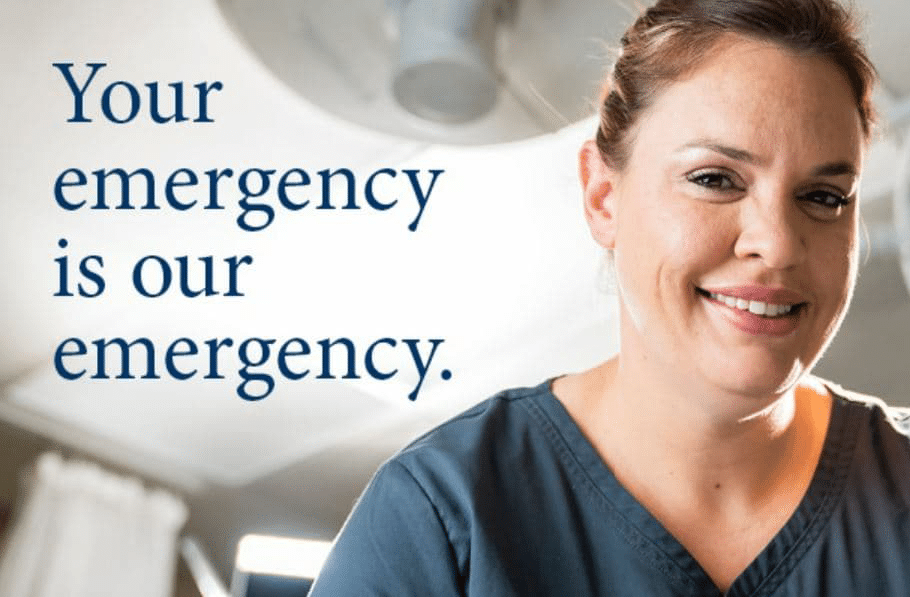Emergency Room in Topeka, KS
At The University of Kansas Health System, we provide comprehensive emergency medical services for a wide range of illnesses, injuries and conditions. Our emergency room (ER) pairs leading-edge technology with compassionate care from highly-skilled ER physicians to bring you emergency care that you and your loved ones can depend on at a moment’s notice.

Emergency Conditions We Treat
Our doctors are prepared to diagnose and treat a wide range of emergency conditions, including:
- Broken bones
- Heart attack
- Infections
- Lacerations, fractures and burns
- Loss of consciousness
- Major head & bodily injuries
- Pregnancy complications
- Respiratory illnesses/complications (COVID-19, pneumonia, etc.)
- Severe abdominal pain
- Severe allergic reactions
- Stroke
When to visit the ER
There are many reasons you or a loved one might need to visit an emergency room. The following symptoms and conditions may indicate a need for emergency medical care:
- Any sudden or severe pain
- Confusion or changes in mental status
- Coughing or vomiting blood
- Difficulty breathing, shortness of breath
- Difficulty speaking
- Fainting, sudden dizziness, weakness
- Gastrointestinal bleeding
- Serious cuts and wounds (lacerations)
- Severe or persistent vomiting or diarrhea
- Sharp, sudden chest pain
- Stroke (cerebrovascular accidents)
- Sudden changes to your vision
- Sudden shortness of breath/respiratory issues
- Uncontrolled bleeding
- Unusual abdominal pain
If you are experiencing any of these emergency symptoms, please call 911.
Heart Attack Treatment
According to the American Heart Association, someone has a heart attack every 40 seconds in the United States. Damage to the heart during a heart attack depends on the time between cardiac arrest and treatment, as well as the size of the area where blood supply was blocked.
Our doctors work diligently with our cardiology department to provide life-saving cardiovascular care to our patients in the Topeka, KS community. We are proud to be an accredited Chest Pain Center Primary PCI with Resuscitation by the American College of Cardiology for our exceptional ability to treat patients with heart attack symptoms.
One way to ensure you have the best chance of recovering from a heart attack is recognizing the symptoms of a heart attack and seeking care as soon as possible. Symptoms of heart attacks include:
- Chest pain or discomfort
- Difficulty breathing or shortness of breath
- Discomfort in the jaw, neck, back, arm or shoulder
- Feeling nauseous or vomiting
- Lightheadedness
- Unusual fatigue
If you believe you may be having a heart attack, call 911 immediately.
Stroke Treatment
At the University of Health System Kansas, we are proud to be recognized as a Certified Primary Stroke Center and Stroke Rehabilitation Center by The Joint Commission for our dedication to fostering better outcomes for stroke patients. One of the best ways to stay ahead of your health is to understand the risks and symptoms of strokes.
According to the CDC, one in three adults in the US have at least one condition or habit that puts them at risk of having a stroke. Patients who arrive at the ER within 3 hours of initial stroke symptoms also have less chance of developing a disability three months after a stroke than those who receive delayed stroke care.
The following symptoms are common signs of stroke:
- Chronic, sudden, and severe pain
- Difficulty speaking or understanding speech
- Dizziness or loss of balance
- Sudden, severe headache without a known cause
- Trouble seeing out of one or both eyes
- Weakness in the face, arms or legs (usually prominent on one side of the body)
If you or a loved one are experiencing any of these stroke symptoms, call 911 immediately.
What to Expect at Our ER
Upon arrival, you will be assessed as soon as possible by triage staff to determine the level of emergency care you require. If your assessment indicates a condition that may be critical, you will be seen immediately. While we recognize that every person’s reason for visiting the ER is important and we make every attempt to keep wait times as short as possible, please be advised that critically ill or injured patients will receive priority treatment regardless of their arrival time. We appreciate your patience as we strive to provide the highest quality of care to all patients as quickly as possible.
